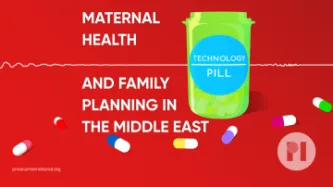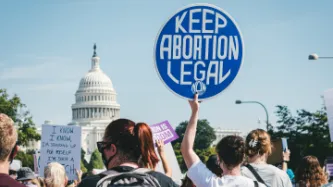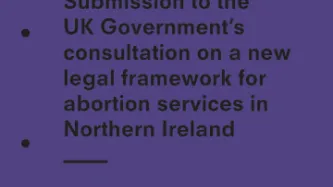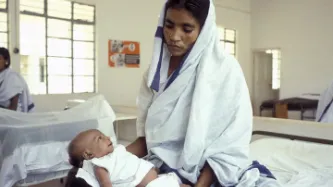Search
Content type: Advocacy
PI welcomes the opportunity to engage once again with the mandate by submitting comments, evidence, and recommendations to the UN Special Rapporteur on the right to health, Ms. Tlaleng Mofokeng. We hope that our input will contribute to the forthcoming report, “Digital innovation, technologies and the right to health”.
Technology has contributed significantly to the planning and delivery of health information, services and care. We have seen the use of data and technology across the healthcare…
Content type: Examples
Following the US Supreme Court's Dobbs decision that paved the way for states to enact legislation criminalising abortion, health advocates warn that the surveillance software schools use to algorithmically monitor students' messages and search terms could be weaponised against teens looking for reproductive health care. These systems can automatically alert school administrators, parents, or police when they detect "dangerous behaviour", which may include anything from imminent suicide…
Content type: Video
Nour El Arnaout is a division manager at the Global Health Insitute at the American University of Beirut, where she also co-ordinates the Institutes's E-Sahha programme focussed on e-health and digital health. She has more than 7 years experience in projects and programmes management, operational management and research, and leads the implementation of large scale field based projects in underserved communities in Lebanon including refugee settlements. She is working on a project called: The…
Content type: News & Analysis
The relationship between privacy and access to abortion care
In 1973, in the state of Texas, it was a criminal offence to “procure or attempt” an abortion except if the purpose was “saving the life of the mother.” This law was enacted in 1854 by the Texas state legislature, and was part of a wave of provisions criminalising access to abortion care that was gaining ground across the U.S in the mid-1800s. It is worth highlighting that these laws were being passed at a time when women in the U.S…
Content type: Long Read
In the wake of the recent news of the US Supreme Court’s decision to overturn the ruling of Roe v Wade in its ruling in Dobbs v Jackson Women's Health Organization, headlines have been dominated by conversations around privacy and fears of how the criminalisation of abortion care and surveillance by law enforcement will play out in a tech driven world.This discussion is increasingly important as governments move towards digitising their healthcare systems and as more individuals choose to…
Content type: Long Read
This piece is a part of a collection of research that demonstrates how data-intensive systems that are built to deliver reproductive and maternal healthcare are not adequately prioritising equality and privacy.
Digital health apps of all kinds are being used by people to better understand their bodies, their fertility, and to access health information. But there are concerns that the information people both knowingly and unknowing provide to the app, which can be very personal health…
Content type: Long Read
This piece is a part of a collection of research that demonstrates how data-intensive systems that are built to deliver reproductive and maternal healthcare are not adequately prioritising equality and privacy.
What are they?
Short Message Services (SMS) are being used in mobile health (MHealth) initiatives which aim to deliver crucial information to expecting and new mothers. These initiatives are being implemented in developing countries experiencing a large percentage of maternal and…
Content type: Advocacy
Privacy International (PI) welcomes the opportunity to respond to this consultation. Established in 1990, PI is a non-profit organisation based in London, dedicated to defending the right to privacy around the world.
The right to privacy is one of the precedents used to establish reproductive rights, and it is established by several international and regional legal instruments. The primary link between the two stems from the fact that laws and policies which impede upon individuals’ rights to…
Content type: News & Analysis
Photo by Ray Witlin / World Bank CC BY-NC-ND 2.0
This article has been written by Ambika Tandon, Policy Officer at the Centre for Internet and Society, in collaboration with Privacy International.
On October 17th 2019, the UN Special Rapporteur (UNSR) on Extreme Poverty and Human Rights, Philip Alston, released his thematic report on digital technology, social protection and human rights. Understanding the impact of technology on the provision of social protection – and, by extent, its…
Content type: Examples
Rewire.News has reported that Google apparently remains unwilling to differentiate its Maps search results between clinics in the US that offer abortion care and faith-based organisations that do not provide abortion care.
Rewire.News reports that, in contrast Yelp "made a concerted effort" to ensure that the company differentiated between faith-based centres, also known as crisis pregnancy centres in the US, and medical facilities that provided medical reproductive healthcare, including…
Content type: Examples
A new investigative report from Sharona Coutts at Rewire exposed how anti-choice groups, including at least one adoption agency, were resorting to using a technology called "geofencing" to find and then target individuals they believe are considering abortion, with targeted ads.
Two groups, a clearinghouse that operates many crisis pregnancy centers and a large adoption agency called Bethany Christian Services, were reported to have hired Copley Advertising to provide them with this…
Content type: Examples
Ahead of the Irish referendum to amend the Constitutions of Ireland to allow the parliament to legislative for abortion which took place in May 2018, Google decided to stop all advertising relating to the referendum on all of its advertising platforms, including AdWords and YouTube.
This followed decisions by Facebook to no longer accept advertising relating to the referendum funded by foreign organisations outside Ireland, and Twitter not allowing any advertising in relation to the…
Content type: Examples
Bethany Christian Services, an international pregnancy support and adoption agency, is launching a programme with Copley Advertising to send targeted ads to individuals visiting Planned Parenthood clinics, abortion clinics, methadone clinics and high-risk areas (AHPA). The targeting will be done through the use of geo fencing based on smartphones located within the selected locations.
Source: https://www.liveaction.org/news//adoption-agency-send-pro-life-ads-smartphones-inside-abortion-…
Content type: News & Analysis
Photo by Jake Hills on UnsplashOur research has shown how some apps like Maya by Plackal Tech and MIA by Mobbap Development Limited were – at the time of the research – sharing your most intimate data about your sexual life and medical history with Facebook.Other apps like Mi Calendario, Ovulation Calculator by Pinkbird and Linchpin Health were letting Facebook know every time you open the app.We think companies like theses should do better and we are pleased to see some of them have already…
Content type: Long Read
In December 2018, Privacy international exposed the dubious practices of some of the most popular apps in the world.Out of the 36 apps we tested, we found that 61% automatically transfer data to Facebook the moment a user opens the app. This happens whether the user has a Facebook account or not, and whether they are logged into Facebook or not. We also found that some of those apps routinely send Facebook incredibly detailed and sometimes sensitive personal data. Again, it didn’t matter if…
Content type: Examples
The pregnancy apps many women were using in December 2018 proved to be incapable of handling miscarriages, even though up to 20% of all known pregnancies end this way. There are only two choices: allow the apps to continue sending alerts celebrating the pregnancy's progress or delete the pregnancy entirely, losing all the records they'd saved - information that doctors routinely request. Many menstruation apps, similarly, lack the ability to adapt to long breaks and disrupted cycles, and many…
Content type: Examples
Le Monde exposed anti-IVG (anti-abortion) advertising on Facebook as part of a borader campaign led by anti-abortion website IVG.net. The advertisement relied on stock photos and fake testimonies posted in public Facebook groups and promoted to young women. Most of the posts attempt to promote the idea that abortion leads to mental health issues, a fact that has been proved to be falacious.
https://www.lemonde.fr/les-decodeurs/article/2018/07/11/les-anti-ivg-ciblent-les-jeunes-femmes-grace-aux…
Content type: Examples
French website IVG.net, first Google result when typing IVG (Interuption Volontaire de Grossesse or abortion in french), has been exposed as being anti-abortion website spreading misinformation. Offering an official looking "Numero vert" (free to call phone number number), IVG.net attempts to convince pregnant women calling the service that abortion is a high risk operation which will have terrible impact on their health and personal life, pressuring women to not undertake such operation. The…
Content type: Long Read
Photo by David Werbrouck on Unsplash
This is an ongoing series about the ways in which those searching for abortion information and procedures are being traced and tracked online. This work is part of a broader programme of work aimed at safeguarding the dignity of people by challenging current power dynamics, and redefining our relationship with governments, companies, and within our own communities. As an enabling right, privacy plays an important role in supporting the exercise of…
Content type: Examples
Cases of people being denied healthcare as they fail to provide an Aadhaar number have already started emerging. A 28-year old domestic worker, for instance, had to be hospitalised for a blood transfusion after she had an abortion with an unqualified local physician. She had been denied an abortion, to which she was legally entitled, from a reputable government hospital, as she did not have an Aadhaar card. Following this case, 52 public health organisations and individuals issued a statement…
Content type: News & Analysis
Creative Commons Photo Credit: Source
In the third episode of the Gender and Privacy Series, we talk about sex and privacy with two female activists: Sarah Jamie Lewis, an expert on the security of internet-connected sex toys, and Joana Varon, founder of the female-led Brazilian NGO Coding Rights.
Listen to the podcast here.
















